孤獨行者的自由 Freedom of a Lonely Passenger
高名潞 By Gao Minglu
孤獨行者的自由
高名潞
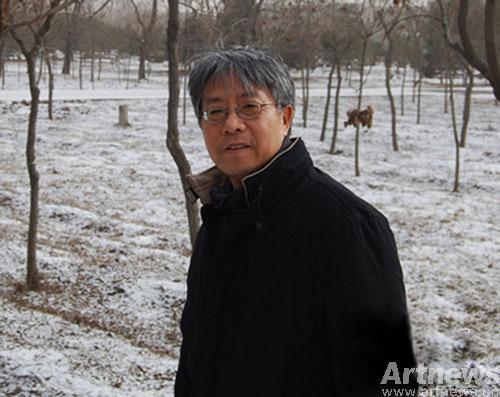
高名潞先生 Mr. Gao Minglu
終極關懷問題仍然是中國當代藝術的主要問題。八十年代的終極關懷被九十年代以來的犬儒主義和重商主義所拋棄,但是,不等於它沒有意義,也不等於中國當代藝術中沒有保持渴望終極關懷的有識之士和保持終極關懷的藝術。在過去三十年,出現了一些堅持在日常冥想、創作和書寫中追索終級關懷的文人藝術家,他們的共同特點是,不加入時尚,始終默默地在如何書寫和視覺化這個終極關懷方面雙向探索。胡志穎就是其中的一位。
書寫和視覺語言的結合並不一定說明藝術家的思想深刻,書寫也不一定等於證明藝術家的文人素質,但是,藝術家,作為現代知識份子的一部分,應當是文化創造的智者和思想者,這已經被中國幾千年的書畫藝術創作所證明。書寫和冥想的深度創作思維之所以在現代社會受到懷疑,一方面是因為工業複製(以及它的衍生品——現成品和波普)在藝術樣式方面所帶來的衝擊,另一方面,精神/物質二元對立的現代性話語強烈衝擊了非西方包括中國的現當代藝術創作。啟蒙主義以來,康得、黑格爾的以精神理念主導世界的哲學被西方後現代主義所顛覆,並走到了反面。物質與精神,人與自然的和諧被幾個世紀人類征服外部世界的“宏偉”工程所破壞。個體的書寫和冥想不再被認為是藝術創作的源泉,相反,時尚和複製等公眾輿論被視為藝術品價值的判斷標準。
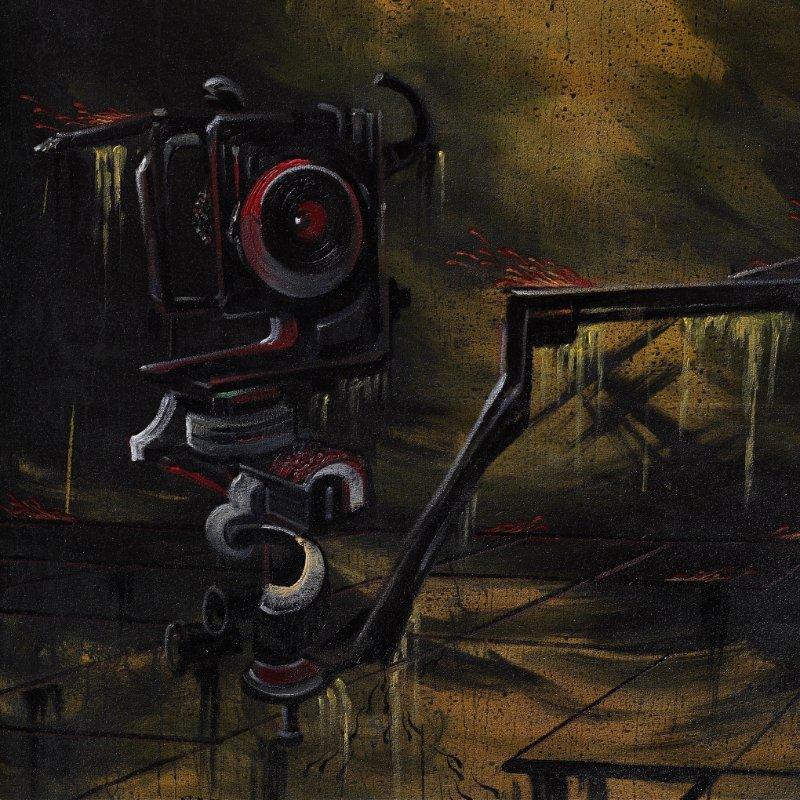 胡志颖 白月(1) 2010,布上油彩、丙烯、大漆,206×163cm HU ZHIYING White Moon (1), 2010, oil acrylics, lacquer on canvas, 206×163 cm
胡志颖 白月(1) 2010,布上油彩、丙烯、大漆,206×163cm HU ZHIYING White Moon (1), 2010, oil acrylics, lacquer on canvas, 206×163 cm
但是,文人性和深度性創作必將在21世紀浴火重生。它有待當代的知識份子藝術家去建樹。因為終極關懷是人類的永恆課題,特別是當全球化把物質主義和都市主義帶到了世界各個角落以後,精神的自我放逐已經成為文化領域的有識之士所遵奉的信仰。
胡志穎是藝術理論的博士,也是有才氣的藝術家,更是一位特立獨行的冥想者。他的博士論文的內容是關於終極關懷的探究,即我們通常所說的“形而上”問題的思考。在他的書中,胡志穎用了“彼岸”的概念去概括的理念。他在書中充分地討論了東方的哲學和文藝理論中的形而上的問題。儘管我認為彼岸的概念太容易讓我們想到基督教精神和西方古典哲學的終極關懷,同時也很難擺脫西方的現實和彼岸二元對立的舊思維模式,但是,胡志穎把它放到東方文化的系統中進行解讀和比較,我認為是非常有意義的。特別是在當代中國缺少形而上熱情的時候,提出對“彼岸”的新解更是當務之急。
無論是形而上,終極關懷還是彼岸,其實在東方傳統中,它們的文化屬性要遠遠大於宗教屬性和社會屬性。中國人講文化,其中已經包含了宗教和政治的意味。“文”對於中國人而言,有太多的意思,它不僅僅指那些具有物質外觀的文化形態。它更是一種精神和終極關懷。南宋鄧椿說,“畫者文之極也!”文人畫之所以能在中國誕生必定和中國人所理解的文化內涵有關。
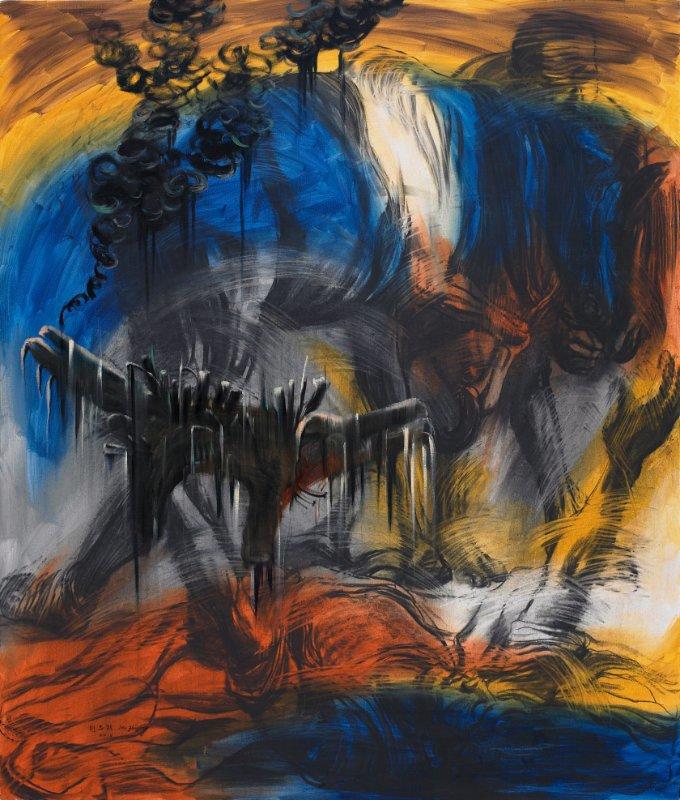 胡志颖 人马记之四,2015,布上油彩、丙烯、木碳,200x170cm HU ZHIYING Men and Horses VI, 2015, oil, acrylics, charcoal on canvas, 170×200 cm
胡志颖 人马记之四,2015,布上油彩、丙烯、木碳,200x170cm HU ZHIYING Men and Horses VI, 2015, oil, acrylics, charcoal on canvas, 170×200 cm
胡志穎的藝術創作大體走過三個階段。八十年代的水墨畫是大山大水,和這個時代的學者水墨,也就是那種我稱之為“宇宙流”水墨的風格是一脈相承的。其特點是追求宏偉氣勢。胡志穎九十年代的繪畫是符號的集成。想超越山水對表現文化象徵性的局限性,轉而直接融入文化符號,多種符號的拼合造成多義性,甚至山水的峰迴路轉也被改造為某種寓意性符號。近年來,胡志穎把符號和培根的畫風結合,其實,胡志穎主要地運用了培根的“體積”形式,而揚棄了培根的“身心”主題。他把主題置換為終極思考的文化主題。胡志穎的“個人宗教”傾向導致對培根的執著追尋的崇敬,同時,胡志穎本能所具有的文化信念決定了他選取的形象資源更加自由和多樣。
當代藝術走到今天,最需要的是自由。可是這個自由既不是那種標榜政治身份的意識形態的陳詞濫調,因為它已經被歷史證明很多是假的。也不是犬儒主義的跟風飄移,因為它終究是醉生夢死。自由來源於個人的慧根、定力和良心(社會良心和人性良心),這決定了具有自由的人永遠無法被標籤化和面具化。正是這個個體的深度性和獨立性才能真正地表現自由,因為自由永遠不是從外部來的,它是內在的生成,它來自自由的品質本身。所以,從這個意義上講,自由永遠不屬於流行大眾,而只屬於孤獨的行者。
(原載《胡志穎作品集》,海風出版社,2011)
Freedom of a Lonely Passenger
By Gao Minglu
Ultimate concern remains a main problem of Chinese contemporary art. Ultimate concern of the 1980s has been abandoned by Cynicism and mercantilism of the 1990s, but it does not mean that it is no longer meaningful or that there are no men of insight who keep longing for ultimate concern or art that maintains ultimate concern in the field of Chinese contemporary art. In the past 30 years there have appeared some scholar artists who have persisted in seeking ultimate concern in their everyday meditation, creation and writing and who have the common characteristic of keeping away from fashion and making two way exploration in writing about and visualizing ultimate concern. Hu Zhiying is one of them.
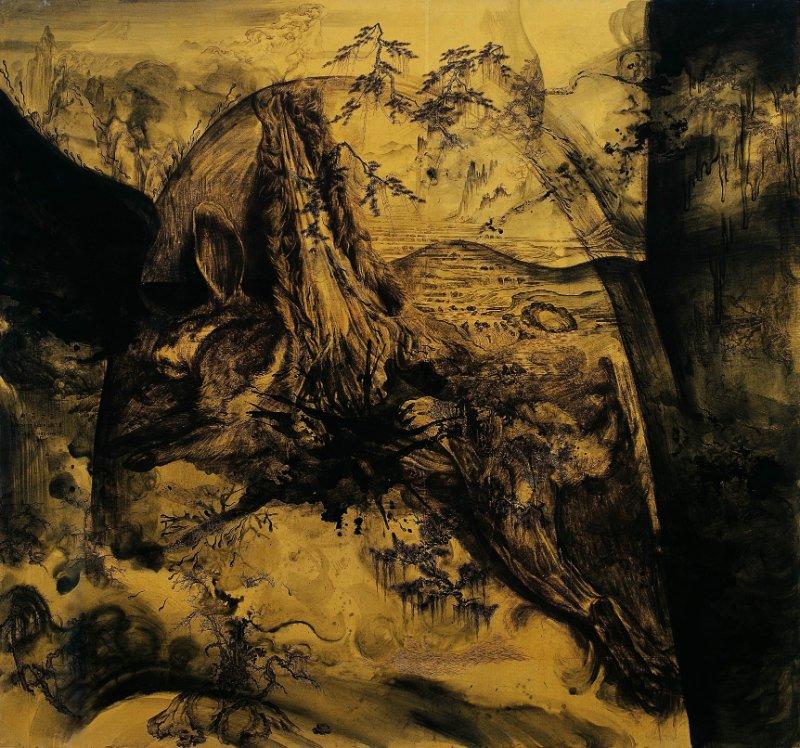 HU ZHIYING Buddhist Scriptures Ⅱ, 1997-1998 Acrylic, ink, charcoal on silk on plank, 183×195 cm
HU ZHIYING Buddhist Scriptures Ⅱ, 1997-1998 Acrylic, ink, charcoal on silk on plank, 183×195 cm
The combination of writing and visual language is not necessarily an indication of the profoundness of an artist’s thinking, and writing is not necessarily a testimony of an artist’s literati quality. However, as part of modern intellectuals, artists should be wise men and thinkers in the creation of culture, as is proved by painting and calligraphy creation in the past thousands of years in China. The reason why the profound creative thinking embodied in writing and meditation is questioned in modern society is that industrial duplication (and its derivatives — ready-made and pop art) has affected art forms on the one hand and that the modern discourse characterized by binary opposition between spirit and material has a strong impact on non-western (including Chinese) modern and contemporary artistic creation on the other. After the advent of didacticism, the philosophy of Kant and Hegel according to which the world is dominated by the idea of spirit was subverted by Western postmodernism and went to its opposite. The harmony between material and spirit and between man and nature was destroyed by mankind’s centuries-long “magnificent” project to conquer the external world. Writing and meditation by individuals are no longer considered to be the source of artistic creation; on the contrary, the public opinions such as fashion and duplication are regarded as the standard for judging the value of a work of art.
However, scholarly and profound creation will surely revive in the 21st Century and its revival is to be promoted by contemporary intellectual artists. Because ultimate concern is an eternal subject of mankind, especially after globalization brings materialism and urbanism to all corners of the world, spiritual self-exile has become the belief followed by men of insight in the field of culture.
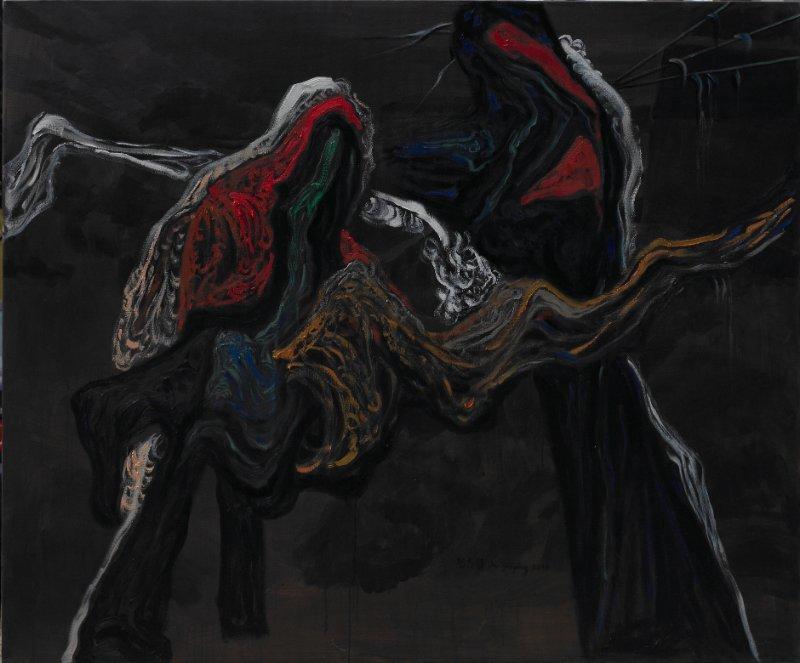 HU ZHIYING The Magic Flute VII, 2014, oil, acrylics on canvas, 140×170 cm
HU ZHIYING The Magic Flute VII, 2014, oil, acrylics on canvas, 140×170 cm
Hu Zhiying is not only a doctor in art theory but also a talented artist and an independent meditator. His doctoral dissertation is an exploration of ultimate concern, that is, reflections on what we usually call “metaphysical” problems. In his book, Hu Zhiying sums up his ideas in the concept of “Paramita”. There he gives a full discussion of the metaphysical problems in Oriental philosophy and theory of art and literature. Although we think that the concept of Paramita (the other shore) too readily suggests to us Christianity and ultimate concern in Western classical philosophy and that, at the same time, it is hard for this concept to break away from the old Western mode of thinking about the binary opposition between reality and the other shore, I think it is of great significance that Hu Zhiying attempts to expound it and to make some comparisons within the system of Oriental culture. Especially when there is a lack of enthusiasm for metaphysical thinking, it is an urgent matter to put forward a new explanation of “Paramita”.
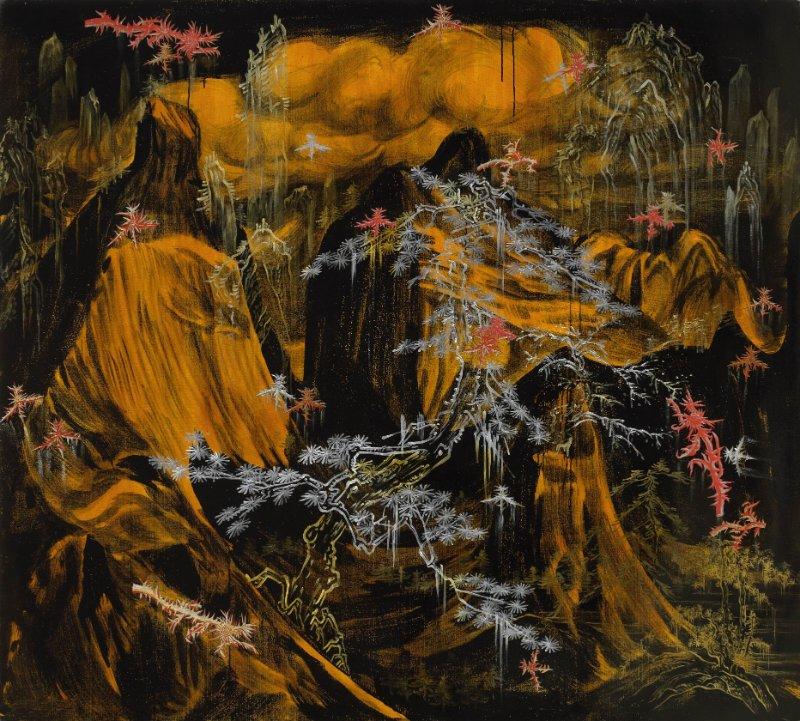 HU ZHIYING Atoms Ⅲ, 1997, mixed media on canvas, 180×200 cm
HU ZHIYING Atoms Ⅲ, 1997, mixed media on canvas, 180×200 cm
Whether it is metaphysics, ultimate concern or Paramita, as a matter of fact, in Oriental tradition, its cultural attribute far outweighs its religious and social attribute. Culture, as the Chinese understand it, already includes religious and political implication. For the Chinese, “culture” has too many meanings. It is a kind of spirit and ultimate concern, rather than merely those cultural forms with material appearance. Deng Chun of the Southern Song Dynasty said, “Painting is an extreme form of culture.” The appearance of literati painting in China necessarily had something to do with the connotation of culture as the Chinese understand it.
Hu Zhiying’s artistic creation, on the whole, has experienced three stages. His ink and wash paintings of the 1980s depict grand mountains and rivers. They and the scholarly ink and wash paintings of that era, that is, the style of what I call ink and wash paintings of “flow of universe”, can be traced to the same origin. They are characterized by the pursuit of tremendous momentum. His paintings of the 1990s are integration of symbols. He tried to surpass the limitation of landscape painting in expressing cultural symbolism and to incorporate cultural symbols directly instead. The piecing together of various symbols leads to ambiguity and even the twists and turns of mountain paths in his landscape paintings are transformed into some symbols with implications. In recent years, Hu Zhiying has combined symbols with Francis Bacon’s style of painting, but in fact, he has mainly made use of Bacon’s form of “volume” and abandoned his theme of “body and mind”. He has substituted the cultural theme of ultimate thinking for Bacon’s original theme. Hu Zhiying’s personal religious tendency leads to his reverence for Bacon’s persevering pursuit, and at the same time Hu’s inherent cultural conviction has determined the freedom and diversity of his choice of resources of image.
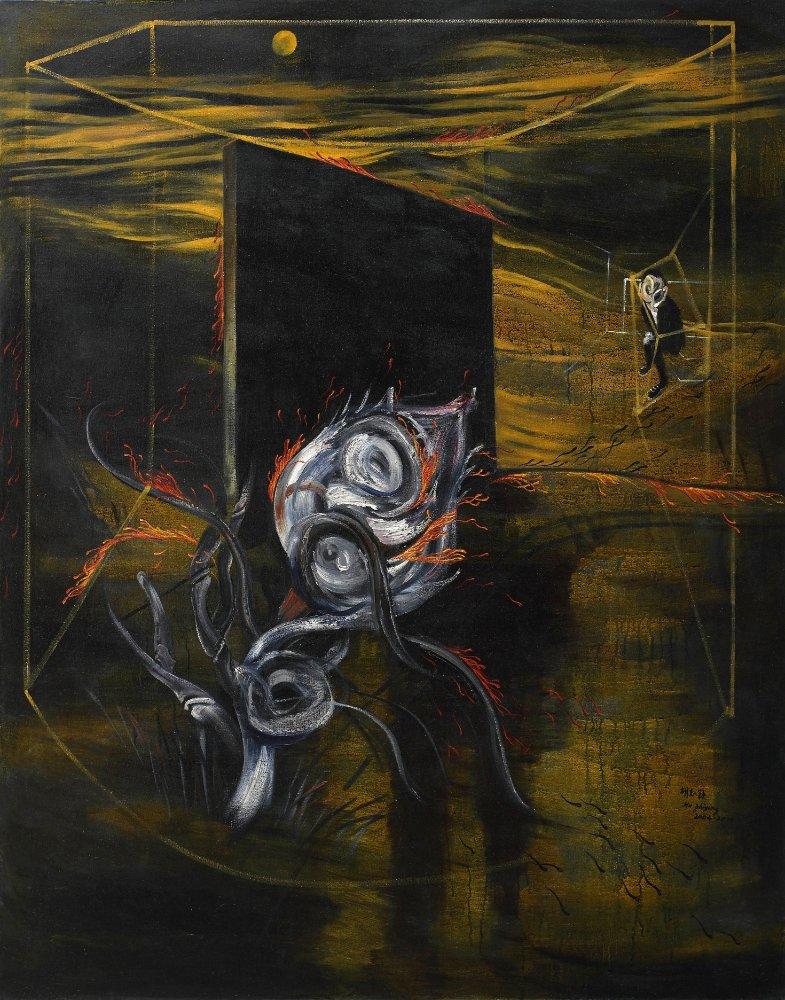 HU ZHIYING Remake Bacon --- Bat and Rose (1) 2004—2005, oil, acrylic, lacquer on canvas,196×153 cm
HU ZHIYING Remake Bacon --- Bat and Rose (1) 2004—2005, oil, acrylic, lacquer on canvas,196×153 cm
What contemporary art needs most today is freedom. This freedom, however, is neither the ideological cliché used to advertise one’s political identity, for it has been proved to be false in many cases by history, nor the Cynical attitude of following the herd, for it means, after all, leading a befuddled life. Freedom comes from a person’s root of wisdom, perseverance and conscience (social conscience and human conscience). This determines that a man with freedom will never be labelized or stereotyped. It is an individual’s profoundness and independence of this kind that make it possible to truly express freedom, for freedom never comes from external things but instead it comes from within, and from free quality itself. In this sense, therefore, freedom never belongs to common people who follow the trend but only belongs to lonely passengers.
(Originally published in A Collection of Works by Hu Zhiying, published by Haifeng Publishing House, 2011)
